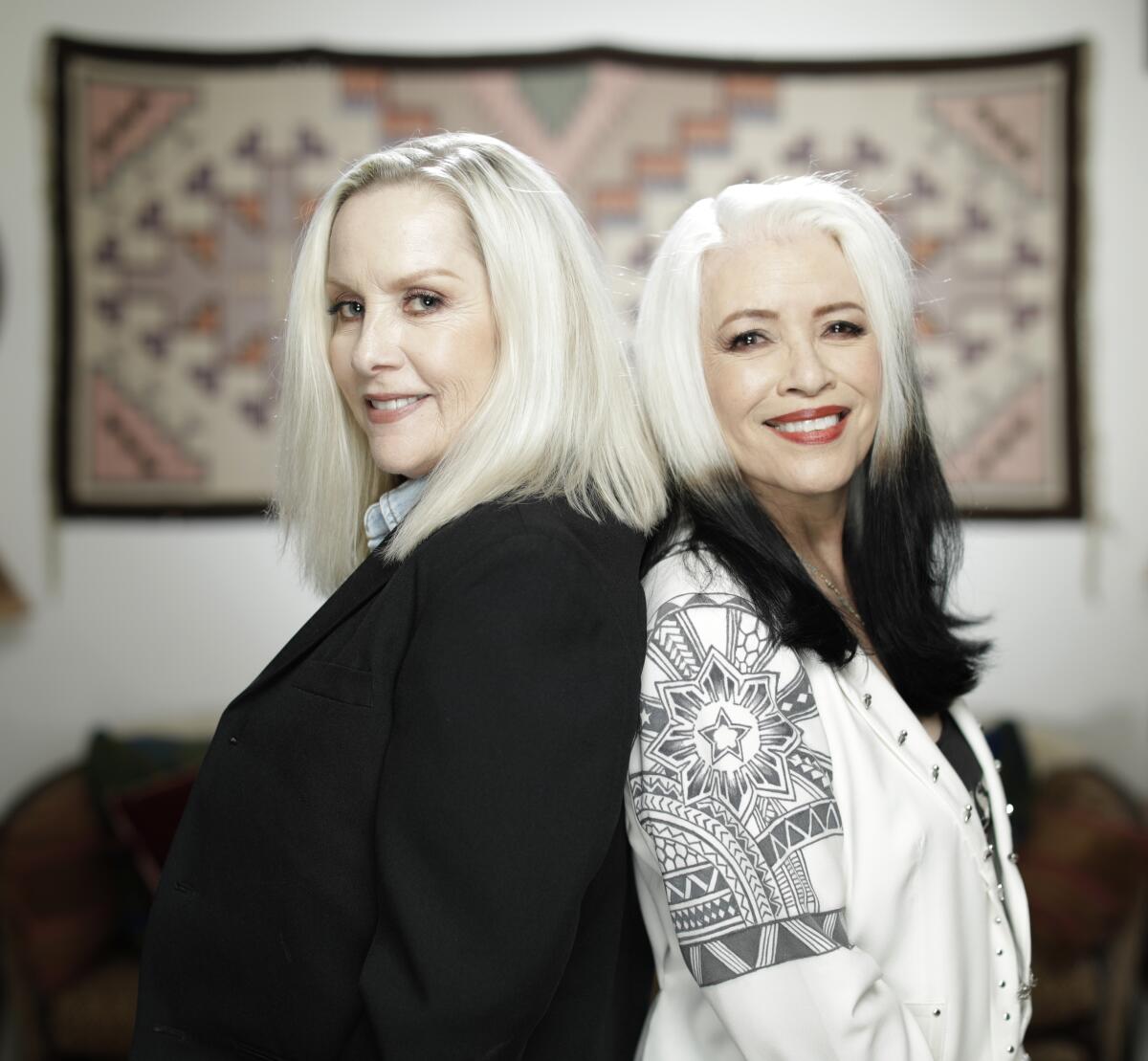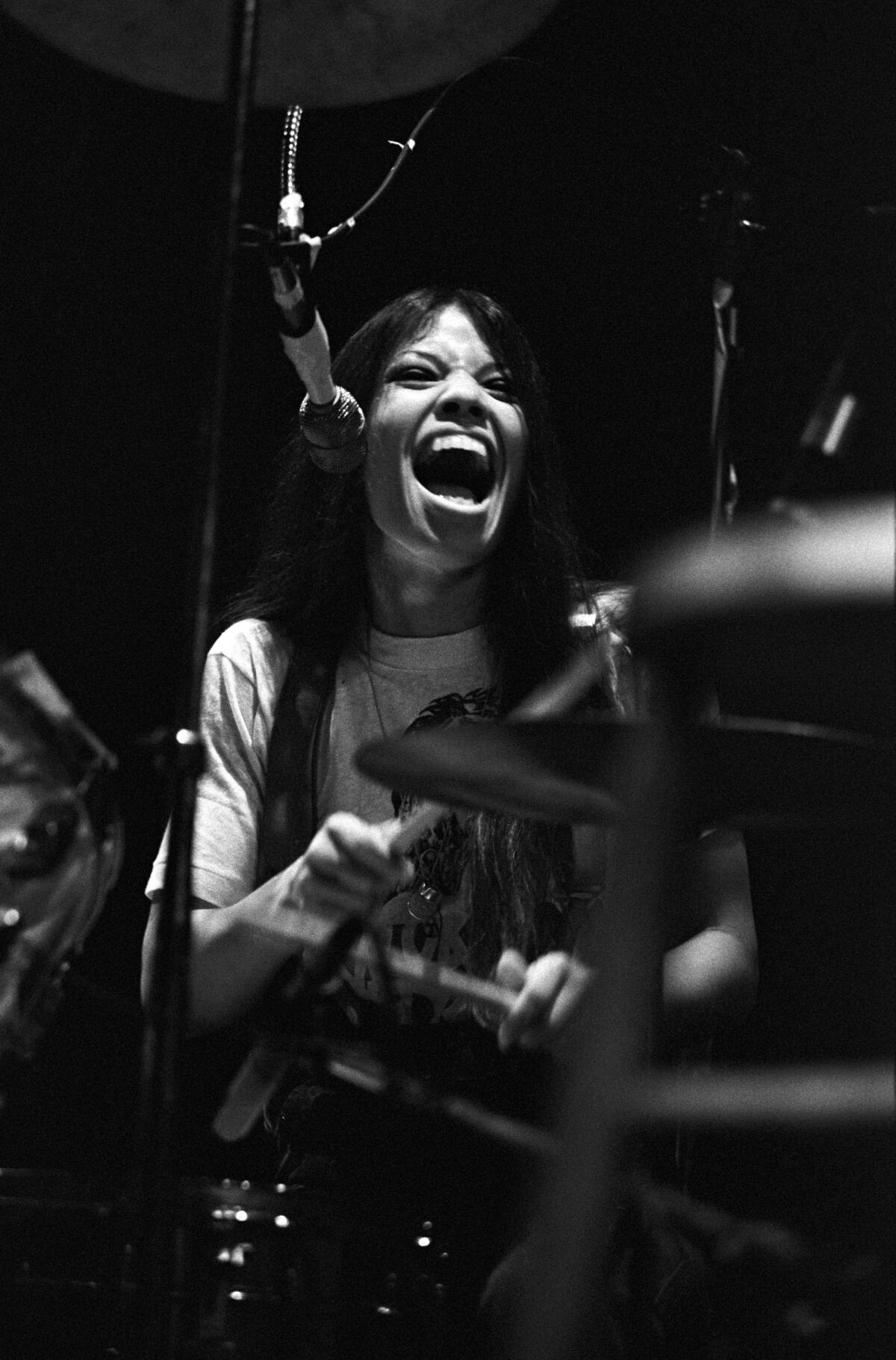How two fearless rock pioneers survived the ’70s and found each other four decades later

- Share via
They were rock ’n’ roll heroines who blazed parallel trails in an era where female musicians were practically an oxymoron. But somehow they didn’t meet until more than 40 years into their respective careers.
Singer-drummer Brie Darling of Fanny and Runaways singer Cherie Currie were both in all-female bands, musical anomalies often enduring similar struggles and triumphs. But it wasn’t until 2017 that another member of Fanny, Patti Quatro, sister and onetime bandmate of iconic bassist Suzi Quatro, introduced the two when Darling was seeking backing vocalists for her album “Fanny Walked the Earth,” released that year.
Darling was immediately taken by Currie’s “energy and charisma.” If the mutual admiration and excitement was there, the trust wasn’t immediate. “This business really hurts; people can destroy your self-esteem and trust in yourself,” Currie says. “We hear this stuff all the time; [women] always think, ‘What’s the motive? What’s the agenda?’”
The skepticism was warranted; both women began playing music in their teens, the Runaways especially guided and misguided by older men with sometimes prurient interests who treated the group as a novelty. Both Fanny and the Runaways paved the way for scores of artists, female and male too, without achieving either mass success or acceptance among fellow musicians or critics.
Yet Currie, now 59, and Darling, 69, remained in touch after the project wrapped, bonding over shared career disappointments and future hopes; they eventually decided to combine forces. “This Is Our Time,” a song off their forthcoming debut album, “The Motivator,” provides their rallying cry: “It’s hard to get to the places we’ve never been, but it ain’t over yet / We never thought of giving up; standing up, fighting for what should have been.”
“It can be looked at as a feminist anthem,” Darling says. “But it can be looked at as a personal anthem, because it’s our story. Out of the Runaways, Joan Jett has a wonderful career; Lita Ford has a wonderful career; Cherie needs the same opportunity. Cherie and I are looking at each other, going, ‘Come on, girl. Let’s do it together. We can speak for women, we can speak for ourselves.’ ‘Our Time’ is for anybody who is striving for something.”
The #MeToo and Times Up movements have sparked widespread, often galvanizing change, but in this venture, Darling and Currie forgo dwelling on past wounds or joining existing crusades. “We really feel like we’re starting our own movement,” says Currie: “‘It ain’t over till it’s over.’ People who think that their lives are washed up, you’re just not, not until you take that last breath. Anything can happen.”
Post-Runaways, when she was still a teenager, Currie was the victim of a brutal rape, assault and kidnapping, which she chronicled in her 1989 autobiography, “Neon Angel: A Memoir of a Runaway” (reissued in 2010). “I didn’t think I was going to live through it. It’s so important that you tell someone right when it happens,” she says. “You should never be shamed, you should never feel ashamed. It’s never your fault.” Her assailant received only a year-long sentence, but in the decades since, she says, “I helped a lot of rape survivors and the rape survivors have helped me as well.” She adds, “Surviving something like that gives you a whole lot of power.”
That power serves her well as songwriter and, now yet again, a musical pioneer — code for being a woman of a certain age. “Just because we’re the ages we are, if somebody wants to put a stigma on that, screw them,” says Darling. “We didn’t run out of enthusiasm. We didn’t run out of our voices. We didn’t run out of anything. We’re still here, we’re still valid. More so because of our histories.”
In the Runaways, Currie was known for skintight jumpsuits and a white satin corset onstage; these days, she favors Southwestern chic — tight jeans, big belt buckles, chunky turquoise jewelry. Her medium-length hair is still blond, if tempered from her platinum youth. Darling dresses in colorful clothes she laughingly terms “ridiculous,” wears bright lipstick, and her hair is white on top with the bottom fringed in black. Both have personalities that match their style; Currie is cool, resolute and outdoorsy, while Darling, who has three grandchildren (their dad is Mötley Crüe’s Nikki Sixx), is vivacious and endeavors to do some form of art daily, including decorating dramatic desserts that landed her on the Food Network’s “Cake Wars.”
The lack of a shared history between the two powerhouses isn’t so surprising: If today’s rock world still remains heavy on the testosterone, in the ’70s, Currie and Darling were almost unimaginably isolated, with only Suzi Quatro and a precious few others to look to for inspiration. Singer-songwriters like Joni Mitchell and Judy Collins were adulated; women playing instruments in sexualized rock ’n’ roll bands were not. The Runaways, punky and rebellious, faced, at best, skepticism, objectification and derision. In “Neon Angel,” there are passages about the cruel, esteem-crushing screaming and putdowns of producer-svengali Kim Fowley, who played a formative role in Currie’s music and life. Her memoir was turned into the 2010 movie “The Runaways,” with Dakota Fanning as Currie.
The Runaways were exemplified by their 1976 song “Cherry Bomb,” a teasing come-on of burgeoning sexuality as performed by then-teenage girls. It remains a cult classic, used in TV shows, video games and films, including a crucial sequence in the 2014 blockbuster “Guardians of the Galaxy.” It was the tune for which Currie wore a corset onstage — and it was her idea.
“It was just for ‘Cherry Bomb.’ It’s so funny; I only wore it for three minutes, but everyone seems to think I wore it for the whole show,” she says. “It was just for that one song to propel it forward, and it worked.”
Lzzy Hale, singer of the Grammy-winning hard-rock band Halestorm, credits Currie’s former group for breaking down doors. “The Runaways were the first of their kind; they showed every girl that it was possible to be a rock star. They proved that you can leave your mark on your own terms. It’s OK if you aren’t interested in the ‘white picket fence,’ if you like to wear black or if you like your music loud.”
Fanny, tamer in look and sound than the Runaways, was one of the first all-female bands to sign with a major record company (along with Goldie & the Gingerbreads and the Pleasure Seekers, featuring the Quatro sisters), signing with Reprise in 1969. The group achieved top 40 success and toured with Slade, Jethro Tull and Humble Pie before disbanding in 1975, just as its biggest hit, “Butter Boy,” landed at No. 29 on the Billboard Hot 100. In the ensuing years, Darling, a multi-instrumentalist, played and toured with artists from Robert Palmer to Carole King.

Darling and Currie bring their hard-won perspectives to their new project. “The Motivator” features socially conscious classic rock covers, along with three intensely personal originals, all rendered with a cool combo of their paired voices and a spate of family and friends, including Currie’s sister, actress Sondra Currie; Darling’s brothers Henry and Phil Berry; and Patti Quatro. Darling and Currie often share lead vocals, or one will take the lead on mostly well-known gems from artists including John Lennon, the Hollies, the Rolling Stones and T. Rex (whose song off 1971’s “Electric Warrior” album gives the album its title).
The album’s creation was without ego or push-pull. “I don’t stand for that; I grew up with it, and I’m fed up with it,” says Currie. “I’m into lifting people up, not putting people down.” While the original tune “Too Bruised” is about the end of a romance, its lyrics about letting go and moving on are applicable elsewhere. “The only way I can really verbalize the metamorphosis that took place over the last six months [working with Darling] is that I had to let go entirely,” Currie says. “Be forgiving of all of it, like I was when I moved Kim Fowley into my house when he was dying. [Fowley died in January 2015. That year, in a Huffington Post article, Runaways member Jackie Fuchs — known in the band as Jackie Fox — accused Fowley of raping her when she was 16.] I really hated that man. He cheated me and stole from me and all this [other stuff]. But I was happy that I took him in. It was a way to forgive and let that go.”
Before Currie met Darling, she was ready to leave the music business entirely. She had put her San Fernando Valley house on the market and was in escrow on a remote piece of land in the California mountain community of Tehachapi that she planned to build on. But Darling and “The Motivator” forged renewed hope for her career. “I’m looking to the future, and really enjoying this project so much; that’s a first for me.”
The women have full lives apart from music and art. Darling has been married since 1993 to Grammy-nominated “Motivator” producer Dave Darling. Currie is close to her ex-husband, actor Robert Hays of “Airplane!” fame (he guests on “The Motivator”), and their son, actor-musician Jake Hays, 28. But the newly minted partners are willing and able to tour and promote “The Motivator,” and in concert will play songs from the Runaways, Fanny and their album. (They will perform at the Grammy Museum in L.A.. on Aug. 1, the day before the album’s release.) And as if to prove that she’s the same thrill-seeker she was as a feathered-hair teen in the ’70s, Currie plans to incorporate one of her passions into the live shows: Since 2002, she’s been a wood-carving artist, using a chain saw to create three-dimensional art out of large pieces of timber.
The duo are looking forward to the camaraderie of gigging, eschewing the drama of any past experiences. “I love being a band member, a team player. It doesn’t always work that way,” acknowledges Darling, “but that’s the way Cherie and I work.”
For her part, Currie is cautious but optimistic about her next career chapter, one she thought would never happen. “I cannot let the same mistakes happen again. When I take off flying from this planet, I want to say I learned and prove that I learned.”
More to Read
The biggest entertainment stories
Get our big stories about Hollywood, film, television, music, arts, culture and more right in your inbox as soon as they publish.
You may occasionally receive promotional content from the Los Angeles Times.










